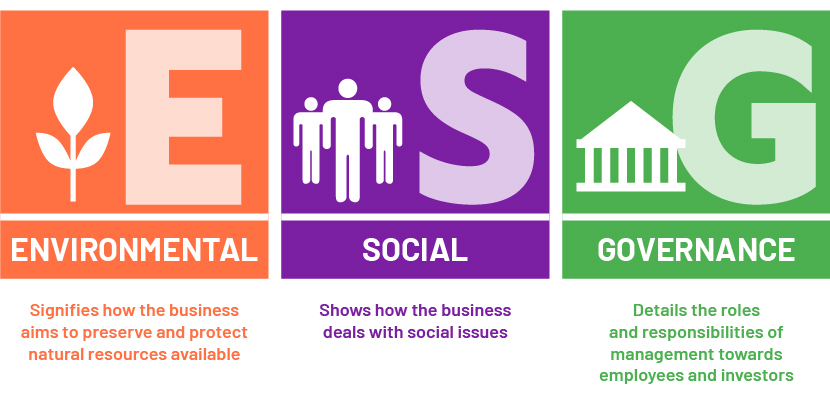Published on July 19, 2022 by Rajesh Dua
ESG stands for environmental, social and governance – the three important factors that determine the sustainability and social impact of an organisation. Investors are now applying these non-financial factors to categorise material risks and growth opportunities before investing. The following illustration describes each of the factors.

The following are benefits of incorporating ESG considerations into company strategy:
-
Strong ESG performance results in higher investor returns. These could be enhanced by allocating capital to more sustainable projects
-
ESG considerations help reduce operational costs, as they emphasise factors such as energy consumption
-
The governance factor ensures shareholder interests are protected at all times
-
The social factor ensures good relationships are maintained with local communities
-
ESG performance predicts customer loyalty. A study found that 88% of consumers are more loyal to an organisation that supports social and environmental issues
-
A strong ESG proposal helps organisations explore different markets and grow their presence in those markets
Regulatory readiness
The UK and the European Union (EU) lead implementation of ESG- and climate risk-related regulations. The US is also expected to take initiatives to include ESG considerations in risk management frameworks.
Importance of ESG
The unforeseen consequences of the pandemic amid the climate change crisis have severely affected the global economy, making policymakers realise the urgency of increasing investment in and accelerating progress on business that prioritises ESG considerations. Society also realises the need for businesses not only to create employment, but also to protect natural resources and consumer interests.
Growth in ESG lending
ESG lending grew to USD322bn in 2021 from USD6bn in 2016, with contract terms and conditions subject to a borrower’s ESG performance. These loans were spread across sectors and were issued mostly by large and publicly listed firms. Studies show that ESG banking activities mainly relate to pre-existing lending relationships.
The EU leads ESG adoption. Countries such as Norway, Singapore, New Zealand, Iceland and Sweden have the highest ESG scores, according to research. The US and a few Asian countries have also adopted ESG approaches in their business and investing styles in recent years. India needs to prioritise adopting an ESG approach in order to meet sector norms.
Six ESG funds launched in India in 2020 collected nearly INR36bn (USD493m) from investors. It is estimated that nearly USD5bn was raised via sustainable bonds in the first six months of 2021. Globally, nearly USD100bn in ESG-related funds came to the markets from 2018 to 2020. It is estimated that ESG investing could be worth USD100tn by 2030.
Challenges in incorporating ESG considerations
Central banks are seeking ways in which to adopt ESG factors in their fixed-income investments. Global central bank reserves have grown to over USD14tn, but only six central banks incorporate ESG considerations in their investments. Equity investors have been incorporating ESG factors in investment decisions for the past 60 years, but only recently have fixed-income investors started doing so.
Central banks need to ensure the approach to ESG is consistent with the current management framework and the traditional role of investment, i.e., to provide safety, liquidity and returns. Incorporating ESG considerations in investment policy is the most effective way to institutionalise this practice, but we list below some of the challenges faced in doing so:
-
Standardising regulatory changes: Regulatory bodies have been working round the clock to formulate a global platform for ESG considerations. Having such a standard could lead to a number of regulations and compliance requirements needing to be met before a business is classified as green and sustainable.
-
Delivering on and communicating ESG commitments: Every financial company would, at some point, need to showcase their ability to handle ESG-related risks and manage ESG opportunities.
-
Understanding materiality: It is impossible for even the best organisations to address all ESG concerns in one go. One way to ensure success is by assessing materiality, i.e., understanding the risks associated with incorporating ESG considerations and the challenges that are most relevant to the sector the company operates in and the overall functional context – geography and sector being the two most important criteria to assess in identifying possible material issues. Doing too little or waiting too long to address the most material ESG concerns could result in a company finding it difficult to catch up with peers, challenging investments over time.
-
Combating climate change: This requires reshaping aspects of society to enhance its resilience, as weather events such as storms, heavy rainfall and droughts damage agricultural land and production facilities, interrupt business processes and reduce value of commercial and residential property.
We list below steps to implementing an effective ESG approach:
-
Define your investment belief, as this would define your sustainable investing strategy
-
Create an integrated framework
-
Opt for a solutions-driven approach
How Acuity Knowledge Partners can help
We are a leader in the financial services outsourcing space and provide a wide range of solutions to clients in areas such as analytics and in-depth research on ESG indicators, policies and structured frameworks, ESG scoring/rating and benchmarks. We offer comprehensive thought leadership and specialised ESG research solutions. We also help investment banks and advisory firms establish and grow their sustainable finance practices by providing customised analysis and support.
Sources:
The Importance of ESG Strategy – Sphera
Why Is ESG More Important Now Than Ever for Your Business? | RegASK
US, Asian countries adopt ESG in business, to know about ESG investing | The Financial Express
Opportunities and challenges for integrating ESG | Financial Services Blog (accenture.com)
Tags:
What's your view?
About the Author
Rajesh Dua has an overall experience of 15+years in banking sector and has worked with companies like BOA, American Express. He has a diversified portfolio in consumer banking , lending services and workforce management.
At Acuity Knowledge Partners, he leads a team for a mid-size US bank ,caters the loan operations banking and provides quality check support to various segments like commercial banking etc. Rajesh Dua holds a post graduate degree in banking and finance from Narsee Monjee Institute of management studies.
Like the way we think?
Next time we post something new, we'll send it to your inbox








